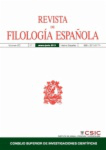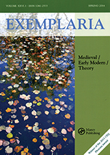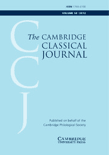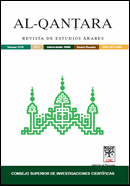
Filologia Mediolatina
Scope & Guideline
Delving into the Nuances of Medieval Linguistics
Introduction
Aims and Scopes
- Manuscript Studies:
The journal emphasizes the critical examination of Latin manuscripts from the medieval period, including their transmission, preservation, and historical significance. - Textual Criticism:
It provides a platform for discussions on textual variants, authorship, and the evolution of medieval texts, contributing to a deeper understanding of literary heritage. - Interdisciplinary Approaches:
The journal encourages interdisciplinary research that connects philology with history, theology, and cultural studies, facilitating a broader understanding of medieval texts. - Literary Analysis and Interpretation:
It focuses on the analysis of themes, genres, and stylistic elements within Medieval Latin literature, promoting new interpretations and scholarly discussions. - Reception Studies:
'Filologia Mediolatina' explores how medieval texts were received and transformed in later periods, highlighting their ongoing relevance and impact.
Trending and Emerging
- Digital Philology:
There is a rising interest in the application of digital humanities tools to the study of Medieval Latin texts, enabling new methods of analysis and broader accessibility to manuscripts. - Comparative Literature:
Scholars are increasingly exploring connections between Medieval Latin literature and other literary traditions, fostering comparative studies that reveal cross-cultural influences. - Thematic Studies on Gender and Identity:
Emerging research focuses on themes of gender, identity, and social roles as depicted in Medieval Latin texts, reflecting contemporary scholarly trends towards inclusivity and diverse perspectives. - Ecocriticism in Medieval Texts:
There is a growing trend in examining environmental themes and the representation of nature in Medieval Latin literature, indicating a broader interest in ecocritical approaches. - Intertextuality and Influence:
Recent publications highlight the intertextual relationships between Medieval Latin texts and their subsequent literary traditions, emphasizing the impact of these works on later literature.
Declining or Waning
- Traditional Historical Narratives:
Research focusing solely on straightforward historical accounts or narratives in Medieval Latin literature has become less frequent, as scholars increasingly seek to engage with more complex interpretive frameworks. - Generic Studies of Latin Texts:
There has been a noticeable shift away from generic studies that do not consider the specific historical or cultural context of texts, as the journal promotes more nuanced and contextually grounded analyses. - Static Textual Editions:
The focus on producing static editions of texts without accompanying critical analysis or contextualization has decreased, reflecting a growing trend towards dynamic and interpretative scholarship.
Similar Journals

Revista de Estudios Latinos
Unveiling the Stories Behind Latino HeritageRevista de Estudios Latinos is a leading academic journal published by SOC ESTUDIOS LATINOS, dedicated to advancing the field of Latino Studies. With an ISSN of 2255-5056, this journal serves as a vital platform for scholars, professionals, and students to explore diverse perspectives and research findings related to Latino culture, history, and social issues. Although it is currently hosted under a traditional subscription model, the journal is recognized for its commitment to quality, evidenced by its rigorous peer-review process. Situated in Madrid, Spain, the journal aims to bridge the gap between Latino communities and global academic discourse, fostering an interdisciplinary dialogue that enhances understanding and appreciation of Latino experiences. Researchers interested in contributing to this dynamic field will find a valuable outlet for their work within the pages of Revista de Estudios Latinos, solidifying its role as an essential resource in the study of Latin American and Latino affairs.

Cuadernos de Filologia Clasica-Estudios Latinos
Advancing Classical Philology with Rigorous ScholarshipCuadernos de Filologia Clasica-Estudios Latinos is a distinguished academic journal dedicated to the field of classical philology, with a particular emphasis on Latin studies. Published by UNIV COMPLUTENSE MADRID, SERVICIO PUBLICACIONES, this journal serves as a vital platform for scholars, educators, and students interested in the rich legacy of Latin literature and its linguistic intricacies. The journal, identifiable by its ISSN 1131-9062 and E-ISSN 1988-2343, aims to foster scholarly dialogue through the publication of innovative research articles, critical essays, and book reviews that advance knowledge within this specialized discipline. Although it operates under a non-open access model, its contributions are invaluable, enriching the academic community's understanding of classical texts and their contemporary significance. Through its rigorous scholarship and commitment to excellence, Cuadernos de Filologia Clasica-Estudios Latinos positions itself as an essential resource for anyone invested in the study of classical languages and literatures.

Eikasmos-Quaderni Bolognesi di Filologia Classica
Illuminating the Intersections of Language and ClassicsEikasmos-Quaderni Bolognesi di Filologia Classica is a distinguished journal that focuses on the fields of Classics, Linguistics, and Language, published by PATRON EDITORE S R L in Italy. With its ISSN 1121-8819, the journal has been a vital platform for the dissemination of scholarly work from 2011 until 2021, contributing significantly to the dialogue within these disciplines. Although recognized in the lower quartiles (Q4) of various categories within Scopus, including Classics and Linguistics, and having ranked in the 37th and 19th percentiles respectively, Eikasmos stands as an invaluable resource for researchers, academics, and students committed to exploring classical philology and its interconnections with modern linguistic studies. The absence of an open access model underscores the importance of institutional support in accessing this scholarly work, which continues to enrich the academic landscape of classical studies.

Listy Filologicke
Cultivating a Nexus for Innovative Academic Exploration.Listy Filologicke is a distinguished academic journal published by the Institute of Classical Studies at the Academy of Sciences of the Czech Republic, focusing on the interdisciplinary fields of History, Linguistics and Language, and Literature and Literary Theory. With an ISSN of 0024-4457 and an E-ISSN of 2570-9410, this journal has been a pivotal platform for scholarly discourse since its convergence years began in 2003. Notably, it holds a Q3 classification in History and Linguistics and Language, and a Q2 in Literature and Literary Theory as of 2023. Its rankings within Scopus illustrate its relevance and impact in academia, with noteworthy positions in the Arts and Humanities and Social Sciences categories. Researchers, professionals, and students will find Listy Filologicke an invaluable resource for exploring cutting-edge research, critical analyses, and discourse that contribute significantly to their respective fields. Based in the heart of the Czech Republic, it continues to promote scholarly excellence and foster international collaboration.

REVISTA DE FILOLOGIA ESPANOLA
Unveiling Insights in Linguistics and Literary TheoryREVISTA DE FILOLOGIA ESPANOLA is a distinguished academic journal dedicated to the fields of linguistics and literature, published by the CONSEJO SUPERIOR INVESTIGACIONES CIENTIFICAS (CSIC) since 1954, and has been an Open Access journal since its inception. Situated in Madrid, Spain, this journal has emerged as a crucial platform for the dissemination of scholarly research, with notable rankings including Q2 in Linguistics and Language and Q1 in Literature and Literary Theory as of 2023. The journal's commitment to fostering academic dialogue is reflected in its impressive Scopus rankings, including a 79th percentile in the Arts and Humanities for Literature and Literary Theory. Covering a wide range of topics from linguistic theory to literary critique, REVISTA DE FILOLOGIA ESPANOLA is essential reading for researchers, professionals, and students alike, providing valuable insights and cutting-edge research in the ever-evolving landscape of Spanish philology.

Gripla
Cultivating Knowledge at the Intersection of Language and CultureGripla, published by the Arni Magnusson Institute for Icelandic Studies, stands as a significant academic journal in the fields of linguistics and literary studies. With an ISSN of 1018-5011, this esteemed journal has been releasing cutting-edge research since its inception in 2011. Although currently categorized as Q4 in Linguistics and Language and Q3 in Literature and Literary Theory for 2023, it has showcased robust scholarship with a Scopus rank of #327 in Literature and Literary Theory, placing it within the 70th percentile of its category. Gripla serves as a vital platform for the exploration of Icelandic studies, fostering a deeper understanding of language and literature in a rapidly evolving academic landscape. While it is not an open-access journal, its contributions are essential for researchers, professionals, and students eager to engage with new developments in the linguistics and literary discourse. Situated in the heart of Reykjavik, Gripla continues to enrich the scholarly community by providing insights that bridge traditional knowledge with contemporary relevance.

Exemplaria-Medieval Early Modern Theory
Illuminating Complexities of Textual TraditionsExemplaria: Medieval Early Modern Theory is a distinguished journal within the fields of Cultural Studies, Linguistics and Language, and Literature and Literary Theory, published by Routledge Journals, Taylor & Francis Ltd. With an impressive Q1 ranking in Literature and Literary Theory and notable placements in associated disciplines, this journal serves as an essential platform for scholars dedicated to exploring the complexities of medieval and early modern texts and contexts. Established with a vision to stimulate interdisciplinary dialogue, Exemplaria has evolved from its initial years (1989-1995) to a renewed focus (2002-2024), consistently fostering significant contributions that shape contemporary literary discourse. Although currently not open access, the journal ensures broad reach and engagement through its meticulously curated articles, reviews, and critical essays that challenge traditional narratives and advocate for innovative methodologies. With the journal's ISSN 1041-2573 and E-ISSN 1753-3074, researchers, professionals, and students interested in advancing their understanding of literary traditions are encouraged to explore its rich repository of knowledge, which reflects the dynamic interplay between historical texts and modern interpretations.

Cambridge Classical Journal
Bridging Past and Present Through Scholarly ExcellenceThe Cambridge Classical Journal, published by Cambridge University Press, is a prestigious academic journal that has been a cornerstone of classical scholarship since its inception in 1884. With a focus on advancing knowledge in the fields of Classics, Linguistics, and Literature and Literary Theory, the journal operates with an annual publication cycle, showcasing cutting-edge research that contributes significantly to these disciplines. With a commendable impact factor and ranking in the top quartile (Q1) for Classics and Q2 for Literature and Literary Theory as of 2023, it remains an essential resource for scholars, students, and professionals alike. The journal's commitment to excellence is evident in its rigorous peer-review process and its role in fostering scholarly dialogue on classical texts and their linguistic and cultural implications. While the Cambridge Classical Journal is not an open-access publication, it is invaluable for anyone seeking to deepen their understanding of the classical world and its enduring influence on contemporary thought.

AL-QANTARA
Bridging Cultures, Narratives, and Histories.AL-QANTARA, published by the Consejo Superior Investigaciones Cientificas (CSIC), is a prestigious academic journal that has been at the forefront of interdisciplinary research in the fields of Cultural Studies, History, and Literature and Literary Theory since its inception in 1984. Renowned for its commitment to open access since 1996, the journal promotes a comprehensive understanding of the interconnectedness of cultural narratives and historical discourse, making it an invaluable resource for researchers and students alike. With impressive rankings in Scopus—including a top placement in the Q1 category for Literature and Literary Theory and Q2 in both Cultural Studies and History—AL-QANTARA effectively bridges theoretical insights with empirical research, contributing to robust academic dialogue and innovation. Operating out of Madrid, Spain, it stands as a pillar of scholarly excellence, offering a platform for diverse voices in the humanities to share their findings and engage with critical contemporary issues.

Minerva-Revista de Filologia Clasica
Illuminating the legacy of antiquity through research.Minerva-Revista de Filologia Clasica, an esteemed academic journal published by the Universidad de Valladolid, is a pivotal resource in the fields of Classics, Linguistics, and Literature. With its ISSN 0213-9634 and E-ISSN 2530-6480, this journal has been championing open access since 2017, making high-quality research accessible to a global audience. Based in Valladolid, Spain, Minerva is dedicated to the exploration and dissemination of scholarly work related to classical philology, offering a platform for the exchange of ideas among researchers, educators, and students alike. Recognized in the 2023 category quartiles as Q3 in Classics and Q4 in Linguistics and Language, this journal provides valuable insights and contributes significantly to its fields, allowing authors and readers to engage with important discussions and innovative perspectives. As the academic landscape evolves, Minerva continues to adapt, fostering a vibrant community committed to the advancement of knowledge in antiquity and its linguistic dimensions.